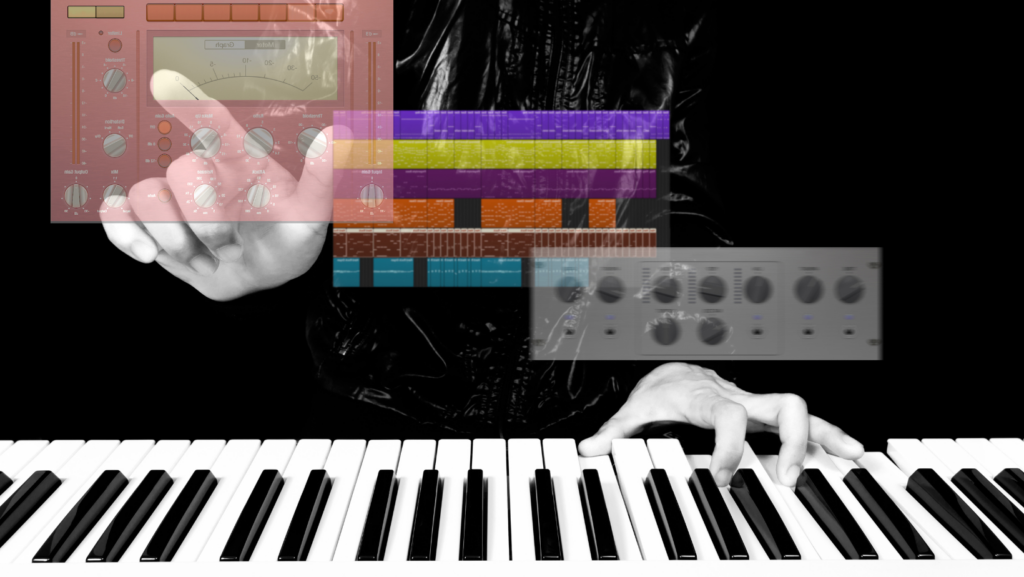As the world spins faster in the digital age, it’s no surprise that music, as a universal language, is also dancing to the beat of technological advancements.
This article explores how technology is shaping the music industry, transforming every note into a symphony of digital innovation.
Technology in Music
 As Impact of Technology continues its ceaseless march forward, the music industry finds itself in a state of constant evolution. From the simplicity of early audio recording tools to the advanced music creation software we see today, technology in music has constructed a tale of progress that has reshaped the music landscape.
As Impact of Technology continues its ceaseless march forward, the music industry finds itself in a state of constant evolution. From the simplicity of early audio recording tools to the advanced music creation software we see today, technology in music has constructed a tale of progress that has reshaped the music landscape.
The journey of technology in music began with simple innovations, establishing a new era of recorded sound. In 1877, Thomas Edison unveiled the phonograph, presenting a new way to capture and reproduce sound. However, it was the invention of the radio in the 20th century that really changed the game. It opened up a world of possibilities, allowing artists and musicians to reach a broader audience. In the decades that followed, other technologies emerged such as the electric guitar and the synthesizer, facilitating changes in how music sounded and was composed.
Digital Age Advances
 Entering the digital age, advancements accelerated at an unprecedented pace. With the advent of the Internet, music evolved from physical to digital, impacting how it’s created, distributed, and consumed. Digital music platforms like iTunes popularized the concept of purchasing individual songs instead of entire albums, fundamentally changing the economics of the music industry.
Entering the digital age, advancements accelerated at an unprecedented pace. With the advent of the Internet, music evolved from physical to digital, impacting how it’s created, distributed, and consumed. Digital music platforms like iTunes popularized the concept of purchasing individual songs instead of entire albums, fundamentally changing the economics of the music industry.
Additionally, the surge of streaming platforms like Spotify and Apple Music restructured music consumption habits, providing access to millions of songs at the touch of a button. On the creation side, software like Pro Tools, Ableton, and GarageBand gave artists the ability to produce high-quality music from home, democratizing the music creation process. This modern era continues to push the boundaries of creativity, proving that in the world of music, the only constant is change.
Impact of Technology on Music Production
Studios to Software
Transition from traditional studios to software solutions marks a noteworthy technological shift in music production. Studios, famous for massive mixing consoles and costly recording equipment, often presented a financial obstacle for aspiring artists. However, music technology has evolved significantly in recent decades. Advanced software solutions such as Pro Tools, Ableton Live, and GarageBand have become accessible to the masses. These applications provide the capability to record, mix, master, and distribute music from a standard home computer. For instance, Billie Eilish and her brother Finneas created the Grammy-winning album “When We All Fall Asleep, Where Do We Go?” predominantly using Apple’s GarageBand.
AI and Automation
 Advances in Artificial Intelligence (AI) and automation offer another layer of impact on music production. Companies have developed AI systems, such as OpenAI’s MuseNet and Sony’s Flow Machines, that can compose music across various genres and styles. These intelligent software programs analyze patterns in a vast array of musical compositions. With this cumulative knowledge, they can generate unique melodies, rhythms, and chord progressions, reducing the manual load on composers. DJing and beatmatching, labor-intensive aspects of music production, can also be automated using technology in music. Pioneer’s Rekordbox and Native Instruments’ Traktor offer automatic beatmatching, helping DJs smoothly transition from one song to another. This automation in music production illustrates how technology continues to redefine traditional creative processes. For visual creatives, reviewing how to make AI pictures can provide additional inspiration and enhance artistic projects.
Advances in Artificial Intelligence (AI) and automation offer another layer of impact on music production. Companies have developed AI systems, such as OpenAI’s MuseNet and Sony’s Flow Machines, that can compose music across various genres and styles. These intelligent software programs analyze patterns in a vast array of musical compositions. With this cumulative knowledge, they can generate unique melodies, rhythms, and chord progressions, reducing the manual load on composers. DJing and beatmatching, labor-intensive aspects of music production, can also be automated using technology in music. Pioneer’s Rekordbox and Native Instruments’ Traktor offer automatic beatmatching, helping DJs smoothly transition from one song to another. This automation in music production illustrates how technology continues to redefine traditional creative processes. For visual creatives, reviewing how to make AI pictures can provide additional inspiration and enhance artistic projects.
Digital advancements and AI have already made their mark on the music industry. The rise of online platforms has democratized music consumption while VR, AR, and multisensory technology are set to take the listener experience to another level. AI’s role in music production isn’t slowing down and could even extend to songwriting. Blockchain technology also holds promise for music rights and monetization. The future of music is undoubtedly intertwined with technology, pushing the boundaries of creativity and reshaping the industry. With these advancements, technology in music isn’t just evolving – it’s transforming. And it’s clear that technology is playing the lead role in this transformation.

